Those students who are finding it difficult to get the answer to the 2015 English Language Question Paper have landed in the right place. Here, we have provided the answers to all questions along with the marking scheme and examiner’s comments on each question. Going through the ICSE Class 10 English Language Question Paper Solution 2015 PDF will help students in their exam preparation. Also, they will get to know the technique of tackling the difficult questions in the exam.
The ICSE Class 10 English Language 2015 Paper 1 exam was conducted for 2 hours of time duration. Download the ICSE Class 10 English Language Question Paper Solution 2015 PDF from the link below and refer to it anytime while revision or practice.
ICSE Class 10 English Language Question Paper 2015
Download ICSE Class 10 English Language Question Paper Solution 2015 PDF
Students can have a look at the ICSE Class 10 English Question Paper Solution 2015 below:
Topics Found Confusing and Difficult in English Language 2015 Question Paper
Have a look at the difficult and confusing topics which students found while attempting the 2015 English Language paper 1.
- Students were unable to deal with the short story. The qualification of what is humorous varied from the vague to the eccentric.
- Students wasted too many words on the reasons for missing the train rather than on the series of mishaps which should have followed missing the train.
- The format of the letter continues to be unclear to the candidates and many children would otherwise have done well and failed to score in question 2.
- Poor reading is reflected in question 3 where candidates are unable to comprehend unseen passages without a teacher’s explanation.
- Grammar, which should have been a high scoring area works the other way around and candidates lose marks because of it.
ICSE Class 10 English Language (Paper 1) Question Paper 2015 With Solution
Question 1: Write a composition (350 – 400 words) on any one of the following:
(a) Write an original story that begins with the words: “He was the funniest boy I had ever met. He would make everyone laugh…………….”
(b) You had booked a ticket on an early morning train. However, you woke up late and missed it. You then decided to run to catch a bus to the next station where you hoped to catch up with the train. Narrate the entire event, how you felt, the effort you made and how you finally caught the train. What did you learn from this stressful experience?
(c) All Girls or all Boys Schools provide a better learning environment than co-educational schools. Express your views either for or against the statement.
(d) Describe in detail the view from your bedroom window. Does your room overlook a park? A busy street? What are the sights, sounds and smells that you would typically see, hear and experience at different times of the day? When do you most enjoy the view? Early in the morning, in the evening or late at night?
(e) Study the picture given below. Write a short story or description or an account of what the picture suggests to you. Your composition may be about the subject of the picture or you may take suggestions from it; however, your composition must have a clear connection with the picture.

Answer:
a) The story must be original. It must begin with the given lines in their entirety. The story should deal with the boy’s comical nature, his ability to make others laugh and then how things change or do not change. The story should begin on a light hearted note- it may change later. The character development of the boy is important, if not original.
b) A first person account – therefore it should be written from the experience of the child. The tension of waking late- the anxiety- putting things together-packing- running to the station- the shock and disappointment at seeing the train leaving the platform-the whole cycle of stress-catching the bus-running to the next station-running on the platform-success or disappointment –lesson learnt.
c) An argumentative essay-views for or against the motion are to be accepted. Credit is to be given for a cohesive, well-constructed, logical argument and ideas and reasoning based on personal experience.
d) This is a descriptive essay-candidate must in vivid sensory detail the view from his /her any window. The description must include details of typical sights sounds and smells that he/she sees, hears and experiences. The description must differentiate between morning and evening/ night experiences and clearly state the time of Question 2 day preferred by the candidate. [words like ‘park’ ‘busy street’ are merely pointers and need not be a part of the description- the candidate may describe ANY view.]
e) Accept a wide interpretation-an essay on Project tiger/wild life sanctuaries/tiger in a zoo etc. Any relevant ideas taken from the picture should be accepted. No penalty if tiger is called leopard/panther or lion…accept any member of cat family! Any other creature. A mere itemized description of the picture is to be penalized.
Question 2: Select one of the following:
(a) Break time (recess) at your school is only for a duration of fifteen minutes. Write a letter to your Principal requesting an extension in the break-time from fifteen minutes to half an hour. Give reasons for your request and explain in what way an extended break would make a difference to you as a student.
(b) You are to be awarded a Special Prize at the Annual Prize Day ceremony of your school. Write a letter to a lady relative giving her the news. Be sure to include details of the prize that you are to receive and tell her why you have been chosen for this honour
Answer:
Formal Letter:
From address (home/school)
Date
To address ONLY Principal, [spelling counts] + School address
Salutation [ Sir/ Madam/ Dear…/ Rev. Mother etc
Subscription. Yours faithfully
Name + surname/initial
Informal letter:
Address (Home/school)
Date
Salutation- Dear/My dear [-name]/female relative
Subscription- Yours lovingly, /Yours affectionately, /Your loving,/affectionate…
First name
Ensure that the format is correct and that the following points of each letter are clearly brought out:
a) Formal Letter (format, content, expression)
1. Why? [Reason for request eg. Not enough time to visit library/ school canteen/ play/ eat]
2. How? [it’ll make a difference-eg. Students feel refreshed / ready for next half / less rushed]
b) Informal Letter (format, content, expression)
(i) Name the prize [eg. Attendance / Maths Prize/ Courage or Bravery Prize]
(ii) Why is awarded? [to reward regular attendance/ to honour the top scorer in maths / for having displayed courage / for doing an act of valour]
(iii) What is the award?- details of award- eg a trophy/ a book/ a cash prize/ cheque, etc.
Question 3: Read the following passage carefully and answer the questions that follow:
Lying in bed, Swami realized with a shudder that it was Monday morning. It looked as though only a moment ago it had been the last period on Friday; already Monday was here. He hoped that an earthquake would reduce the school building to dust, but that good building — Albert Mission School – had withstood similar prayers for over a hundred years now. At nine o’clock Swaminathan wailed, “I have a headache.” His mother said, “Why don’t you go to school in a bullock cart?”
“So that I may be completely dead at the other end? Have you any idea what it means to be jolted in a cart?”
“Have you any important lessons today?”
“Important! Bah! That geography teacher has been teaching the same lesson for over a year now. And we have arithmetic, which means for a whole period we are going to be beaten by the teacher….. Important lessons!”
And Mother generously suggested that Swami might stay at home.
At 9:30, when he ought to have been lining up in the school prayer hall, Swami was lying on the bench in Mother’s room. Father asked him, “Have you no school today?”
“Headache,” Swami replied.
“Nonsense! Dress up and go.”
“Headache.”
“Loaf about less on Sundays and you will be without a headache on Monday.”
Swami knew how stubborn his father could be and changed his tactics. “I can’t go so late to class.”
“I agree, but you’ll have to; it is your own fault. You should have asked me before deciding to stay away.”
“What will the teacher think if I go so late?”
“Tell him you had a headache and so are late.”
“He will beat me if I say so.”
“Will he? Let us see. What is his name?”
“Mr. Samuel.”
“Does he beat the boys?”
“He is very violent, especially with boys who come late. Some days ago a boy was made to stay on his knees for a whole period in a corner of the class because he came late, and that after getting six cuts from the cane and having his ears twisted. I wouldn’t like to go late to Mr. Samuel’s class.”
“If he is so violent, why not tell your headmaster about it?”
“They say that even the headmaster is afraid of him. He is such a violent man.”
And then Swami gave a lurid account of Samuel’s violence; how when he started caning he would not stop till he saw blood on the boy’s hand, which he made the boy press to his forehead like a vermillion marking. Swami hoped that his father would be made to see that he couldn’t go to his class late. But Father’s behaviour took an unexpected turn. He became excited. “What do these people mean by beating our children? They must be driven out of service. I will see…”
The result was he proposed to send Swami late to his class as a kind of challenge. He was also going to send a letter with Swami to the headmaster. No amount of protest from Swami was of any avail: Swami had to go to school.
By the time he was ready Father had composed a long letter to the headmaster, put in an envelope and sealed it.
“What have you written, Father?” Swaminathan asked apprehensively.
“Nothing for you. Give it to your headmaster and go to your class.”
Swami’s father did not know the truth, that actually Mr. Samuel was a very kind and gentle man.
(a) Give the meaning of each of the following words as used in the passage.
One word answers or short phrases will be accepted.
(i) jolted (line 8)
(ii) stubborn (line 21)
(iii) avail (line 45)
(b) Answer the following questions briefly in your own words:
(i) What did Swami wish for on a Monday morning? Why was his wish unlikely to be answered?
(ii) Which sentence tells us that Swami’s father was completely unsympathetic to his son’s headache?
(iii) In what way was Swami’s Mother’s response different from his father’s?
(iv) Why did Swami give a colourful account of Mr. Samuel to his father?
(v) In what way did Father’s behaviour take an unexpected turn?
(vi) What was Swami finally ordered to do by his father?
(c) (i) In not more than 60 words describe how Swami tries to prove that Mr. Samuel is a violent man.
(ii) Give a title to your summary in 3(c). Give a reason to justify your choice.
Answer:
a) (i) Jolted: shaken up badly, jerked, rattled, jarred, jounced, bounced, lurched, [tossed/ bumped/ thrown/ knocked + about. DO NOT accept these words without ‘about’]
(ii) Stubborn: obstinate, unbending, unyielding, adamant, rigid, inflexible, obdurate, mulish, pig-headed
(iii) Avail: use, purpose, benefit, advantage
b) (i) That an earthquake would reduce the school building to dust + that the building had withstood similar prayers for over a hundred years now
(ii) His father said; “Loaf about less on Sundays and you will be without a headache on Mondays” [Must quote exactly. NO MARKS for paraphrasing. Marks deducted if only a part of the sentence is quoted.] No marks for more than one sentence.
(iii) Mother let him rest at home/ believed him/ was kind/ generous/ sympathetic +Father was not (contrast between mother’s response and father’s must be evident.)
(iv) Swami did not want to go to school. + He hoped that his father would believe/ feel sorry for him/ be frightened for him.
(v) Father became excited/angry (with Samuel) + He wrote a letter.
(vi) Give a letter to Headmaster + go to class
c) (i) Swami tries to prove that Samuel was a violent man by saying:
- that he often beat the boys ( especially late-comers)
- a boy had been made to kneel for a whole period
- gave him six cuts
- twisted his ears
- Even Headmaster was afraid of him
- would not stop caning until the boy began to bleed
- would make the boy press bloodied hand to forehead like a vermillion mark.
(ii) Accept any apt title – suited to the summary NOT to the whole passage. [Tile MUST NOT refer to Headmaster/ Swami’s father/ Swami’s friends]
Reason must justify choice of title [not to lift reason from the question].
Question 4:
(a) Fill in each of the numbered blanks with the correct form of the word given in brackets. Do not copy the passage, but write in correct serial order the word or phrase appropriate to the blank space.
Example:
(0) One morning I (0) … (see) the python curled up on the dressing table.
Answer: saw.
It was (1)… (gaze) at its own reflection in the mirror. I (2) … (go) for grandfather but by the time we (3) … (return) to the room, the python (4) … (move) on. He was seen in the garden and once the cook saw him (5) … (crawl) up the ladder to the roof. Then we (6) … (find) him on the dressing table again (7) … (admire) himself in the mirror. “He’s trying to look better for Aunt Mabel” I said. I (8) … (regret) this remark
immediately because grandmother overheard and held up my pocket money for the rest of the week!
(b) Fill in the blanks with an appropriate word:
(i) He found the key just _______ the front door.
(ii) I could not accompany my cousin _______ the trip because I had fever.
(iii) The noise prevented us _______ sleeping.
(iv) The young man put the flute _______ his lips and began to play.
(v) Ashok leaned ________ the wall tiredly.
(vi) The paper dart went gliding ______ the air.
(vii) The cyclist rode quickly ______ the path.
(viii) The young child carried the heavy bucket ______ the stairs.
(c) Join the following sentences to make one complete sentence without using and, but or so.
(i) He has learnt to cycle. He has yet to learn to swim.
(ii) The child helped her mother to make breakfast. She washed the tomatoes.
(iii) They bought a new car. They can travel long distances.
(iv) Sunita opened her purse. She found the money missing.
(d) Re-write the following sentences according to the instructions given after each. Make other changes that may be necessary, but do not change the meaning of each sentence.
(i) Arun gave Ramesh some excellent advice.
(Begin: Ramesh was………………………………………)
(ii) As soon as Sania sat down to study, the lights went off.
(Begin: No sooner ………………………………………………………)
(iii) Has Alia written to you?
(Begin: Have you ……………)
(iv) As soon as the function got over. The crowd dispersed.
(Begin: Hardly had ………………………………………………..)
(v) The monsoon is the best season in our country.
(Rewrite using ‘good’)
(vi) Harish was so tired that he could not keep his eyes open.
(Begin: Harish was too …………………………….)
(vii) Father said to Sunil, “I can help you with your homework.”
(Begin: Father told Sunil………………………………………..)
(viii) Naresh goes to a school which has over a thousand students.
(Begin: There……………………………………………………)
Answer:
(a)
- gazing
- went
- returned
- had moved
- crawl/ crawling
- found
- admiring
- regretted
(b)
(i) near/ by/ beside/outside/ behind
(ii) on
(iii) from
(iv) to
(v) against
(vi) through
(vii) down/along/ across
(viii) up/ down
(c)
- Although he has learnt to cycle/cycling, he has not yet learned to swim/swimming. [Though he…./Inspite of his having learnt…./ Despite having learnt…)
- The child helped her mother to make breakfast by washing the tomatoes.
- Since they have bought a new car, they can travel long distances. [ ‘as’/ ‘because’/ Now that they have bought …]
- Sunita opened her purse to find the money missing/When Sunita opened her purse, she found the money missing/ On opening her purse, Sunita found her money missing [ Do not accept – ‘missing money’/As soon as…./No sooner than…../Hardly….when]]
(d)
- Ramesh was given some excellent advice by Arun.
- No sooner did/had Sania sit/sat down to study, than the lights went off.
- Have you heard from Alia?/ Have you had/ received a letter from Alia?
- Hardly had the function got over when the crowd dispersed.
- No other season in our country is as (so) good as the monsoon.
- Harish was too tired to keep his eyes open.
- Father told Sunil that he could help him with his home work.
- There are more than/ over a thousand students in Naresh’s school/ the school that Naresh goes to/ attends.
For Questions 4C and 4D meaning of the sentence must not change.
The ICSE Class 10 English Language Question Paper Solution 2015 must have helped students with their exam preparation. The answers in the Solution pdf have provided an in-depth to 2015 questions and the way answers to be written to score high marks in the board exam. Apart from the 2015 paper solution, students can find the answers to other papers of ICSE Class 10 Previous Years Questions by clicking here. Happy Learning and stay tuned to BYJU’S for the latest update on ICSE/CBSE/State Boards/Competitive exams. Also, don’t forget to download the BYJU’S App.
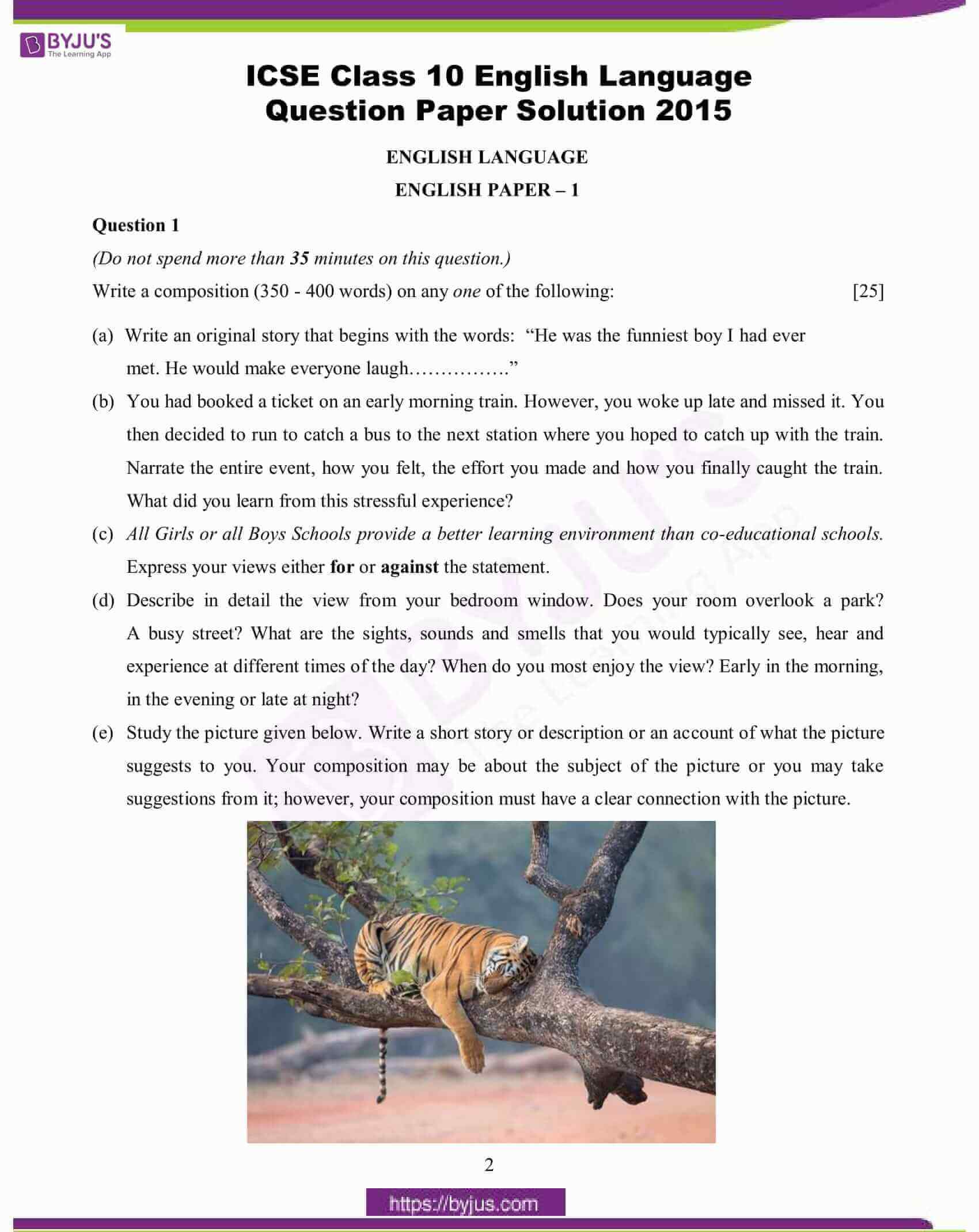
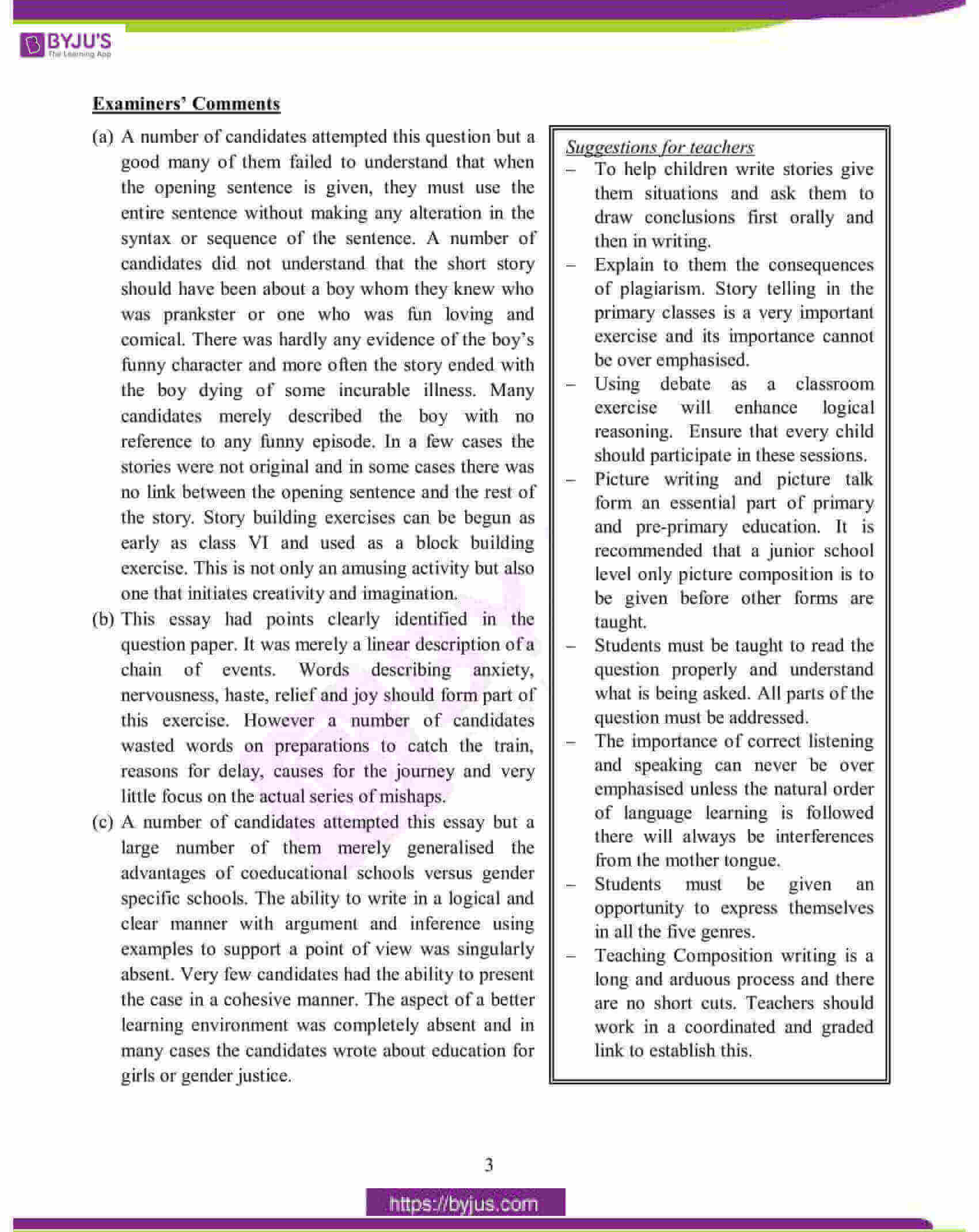
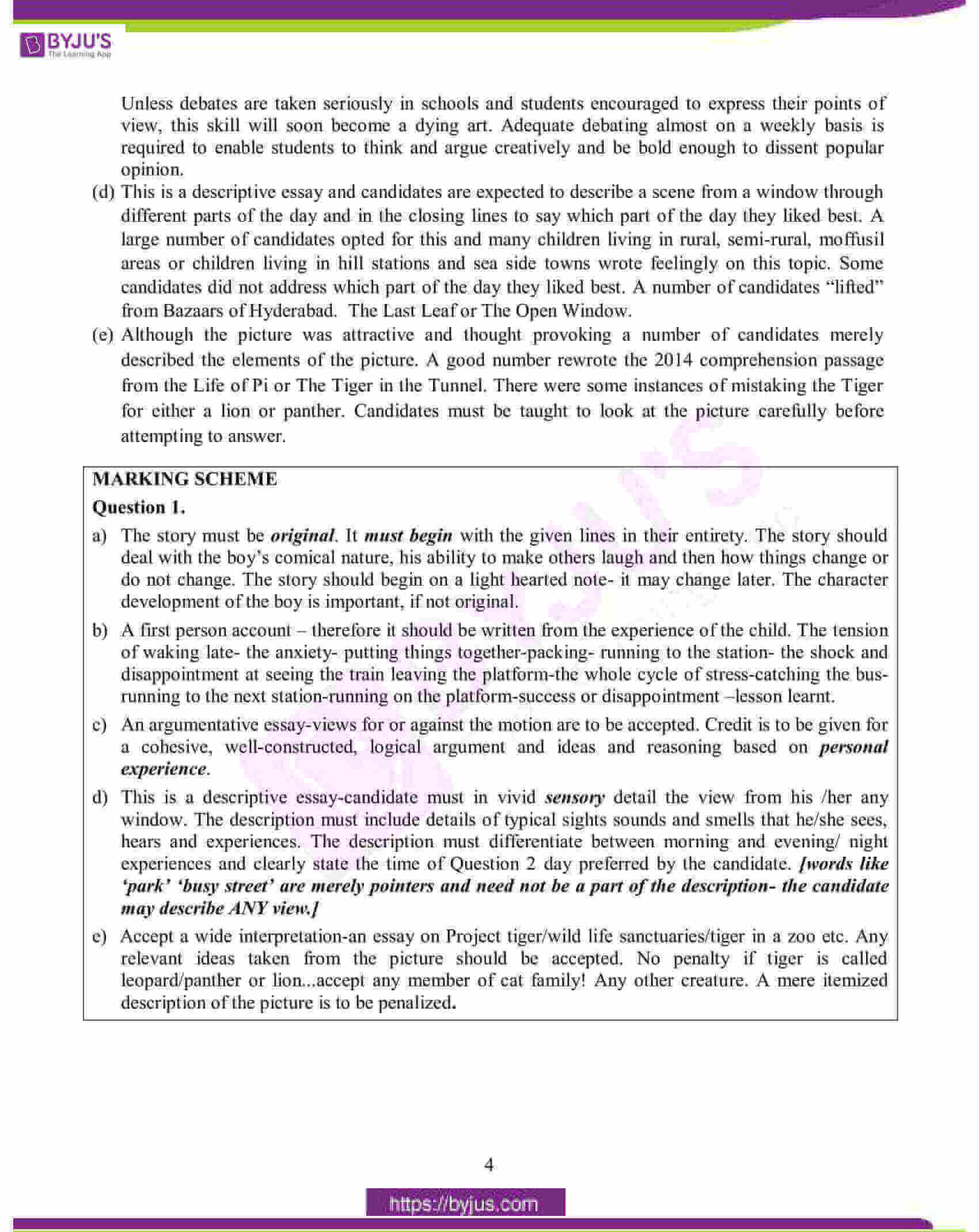
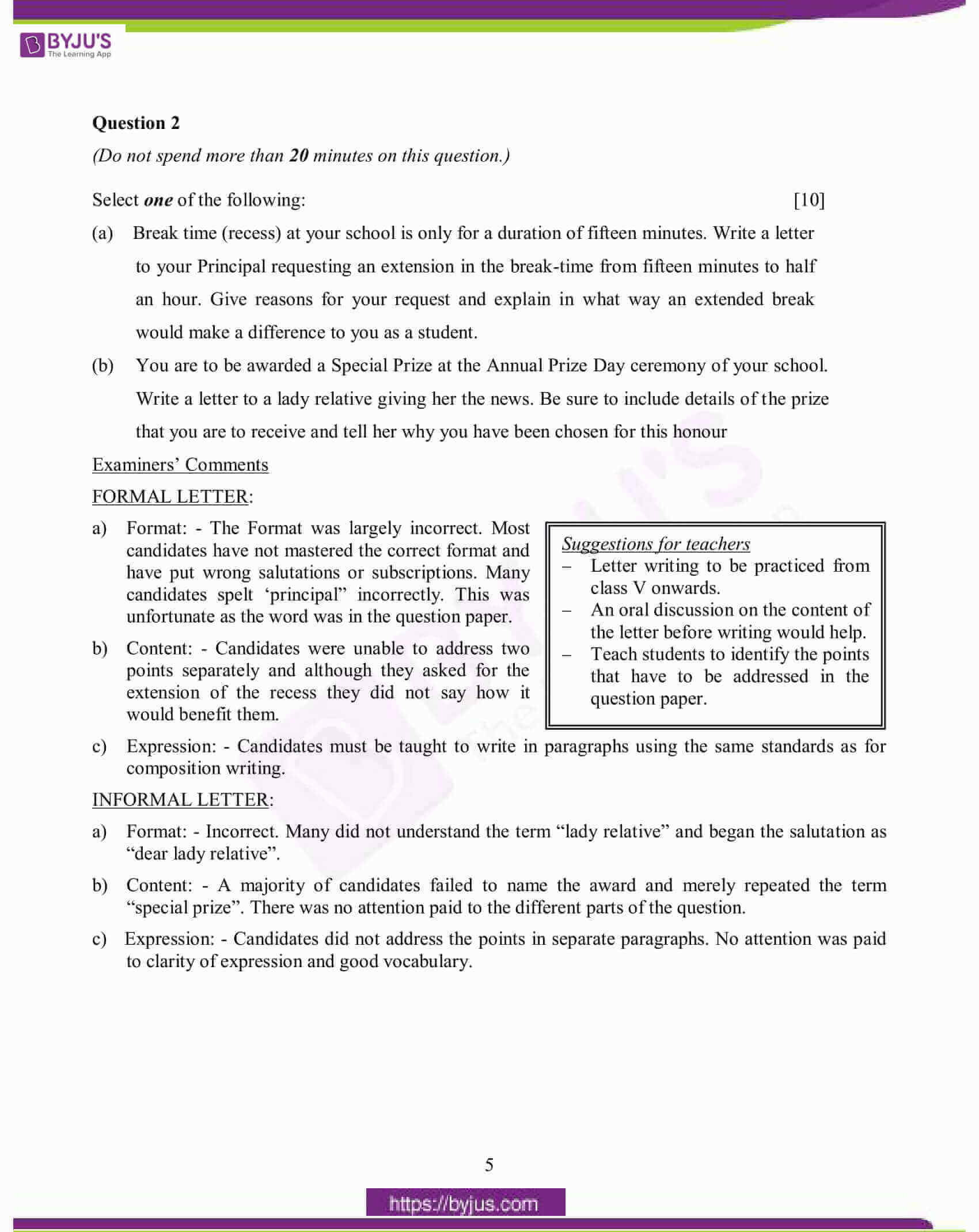
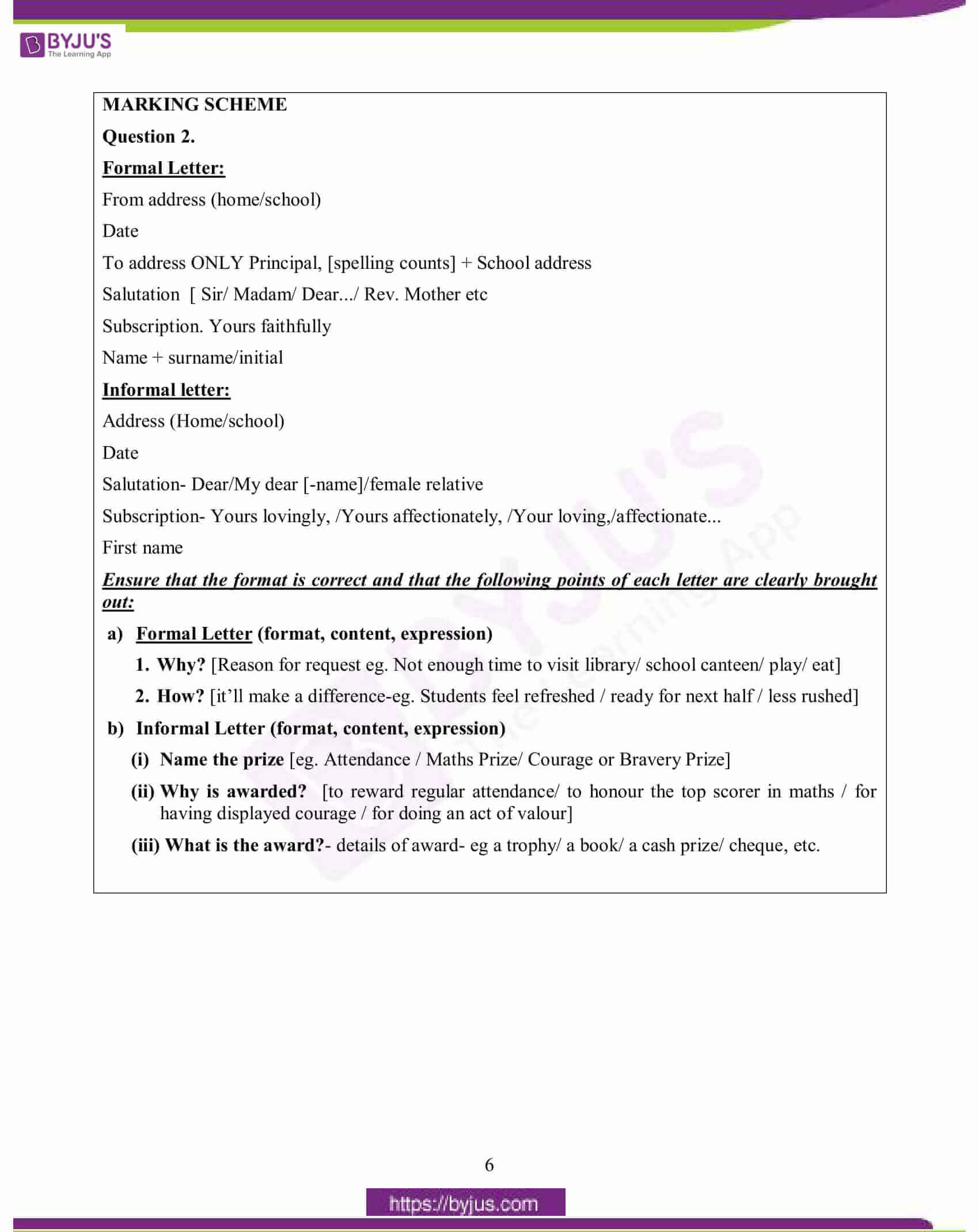
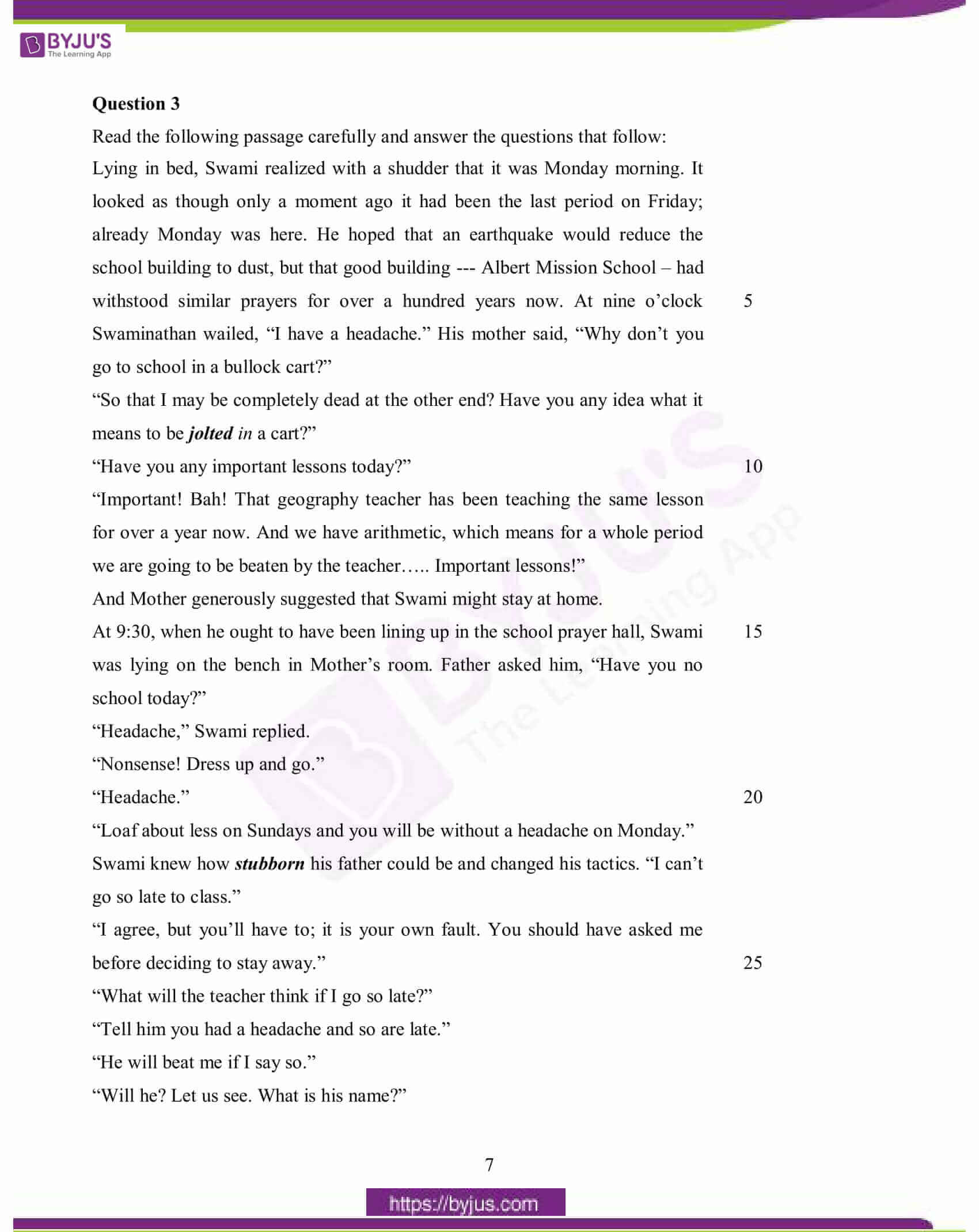
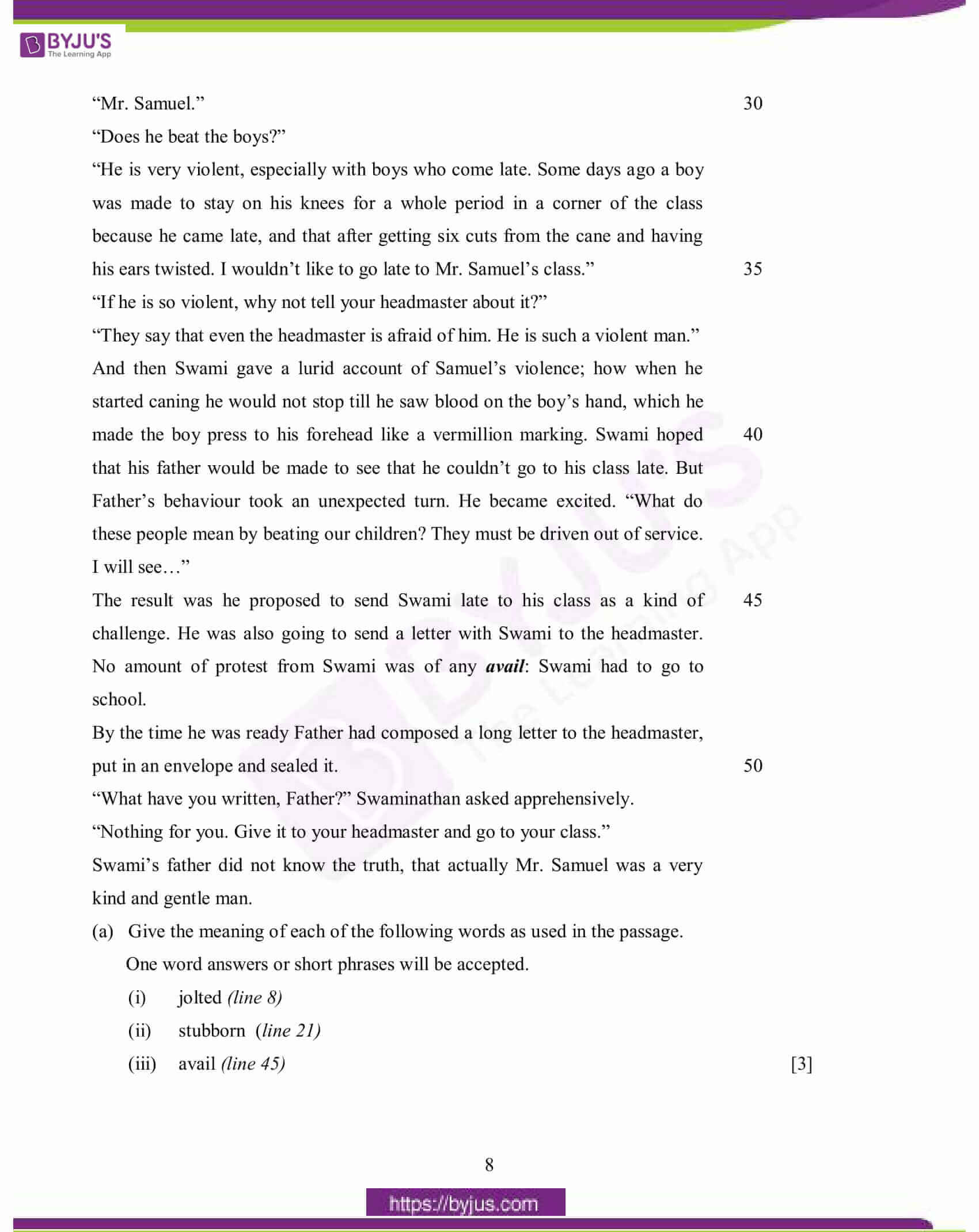
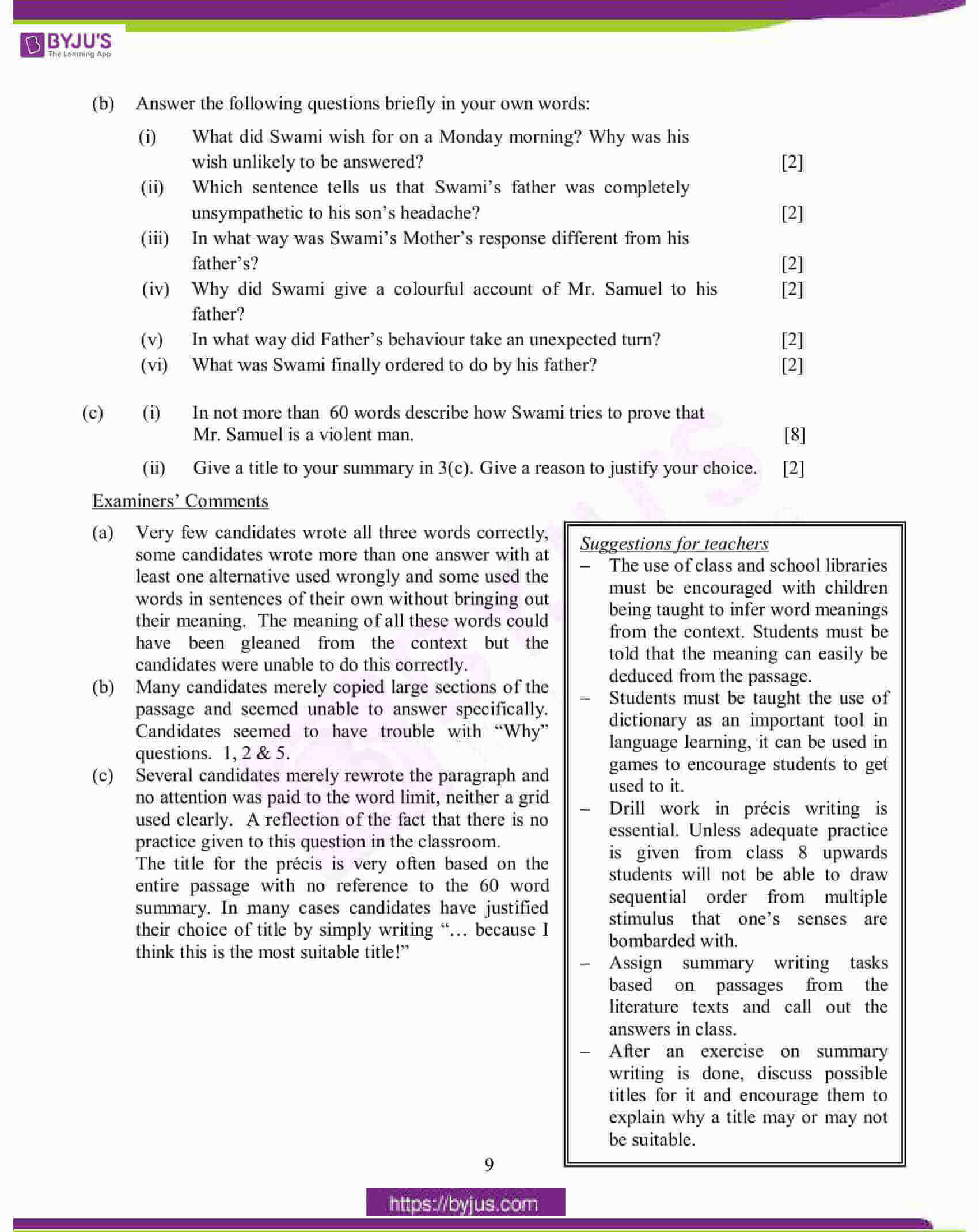
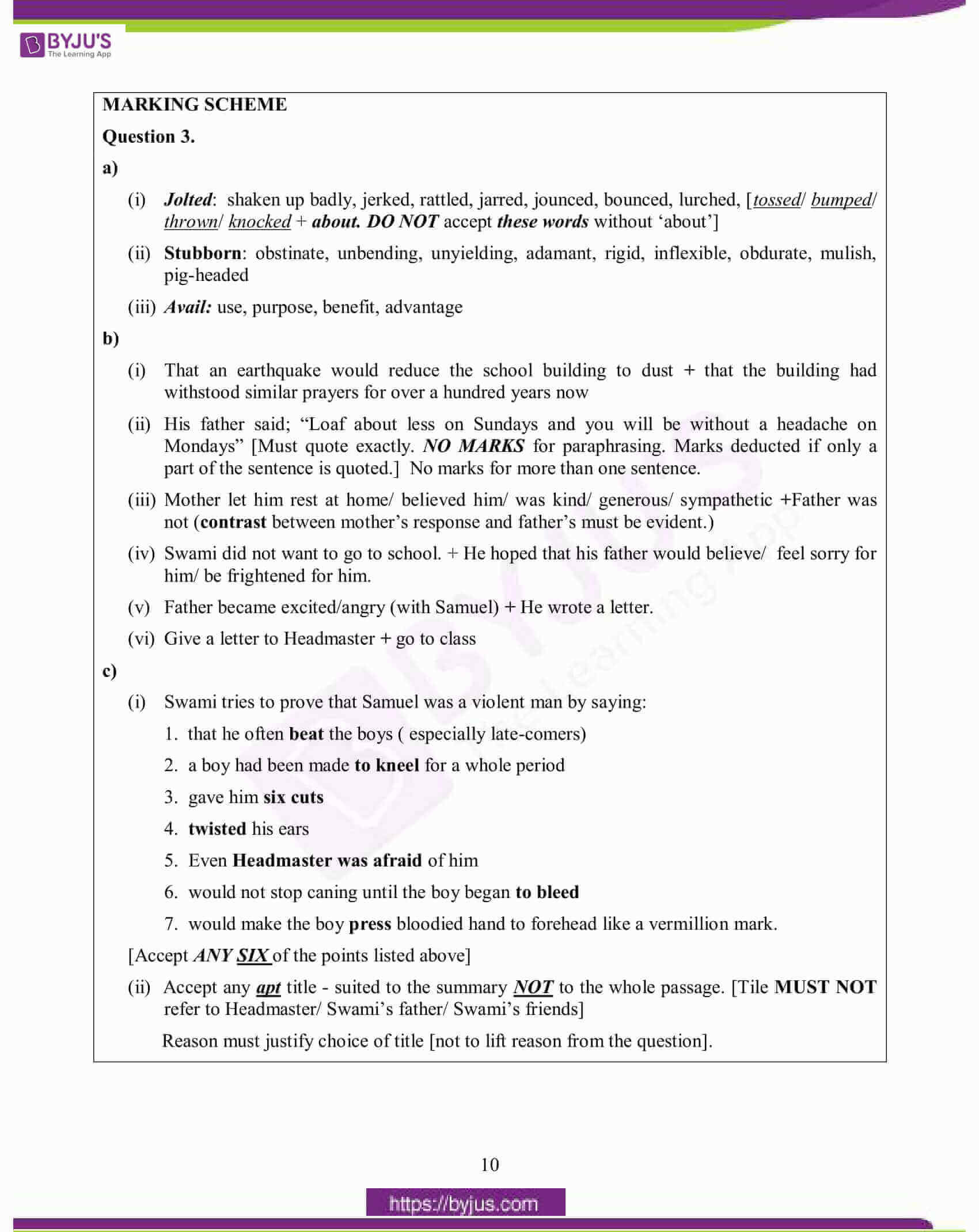
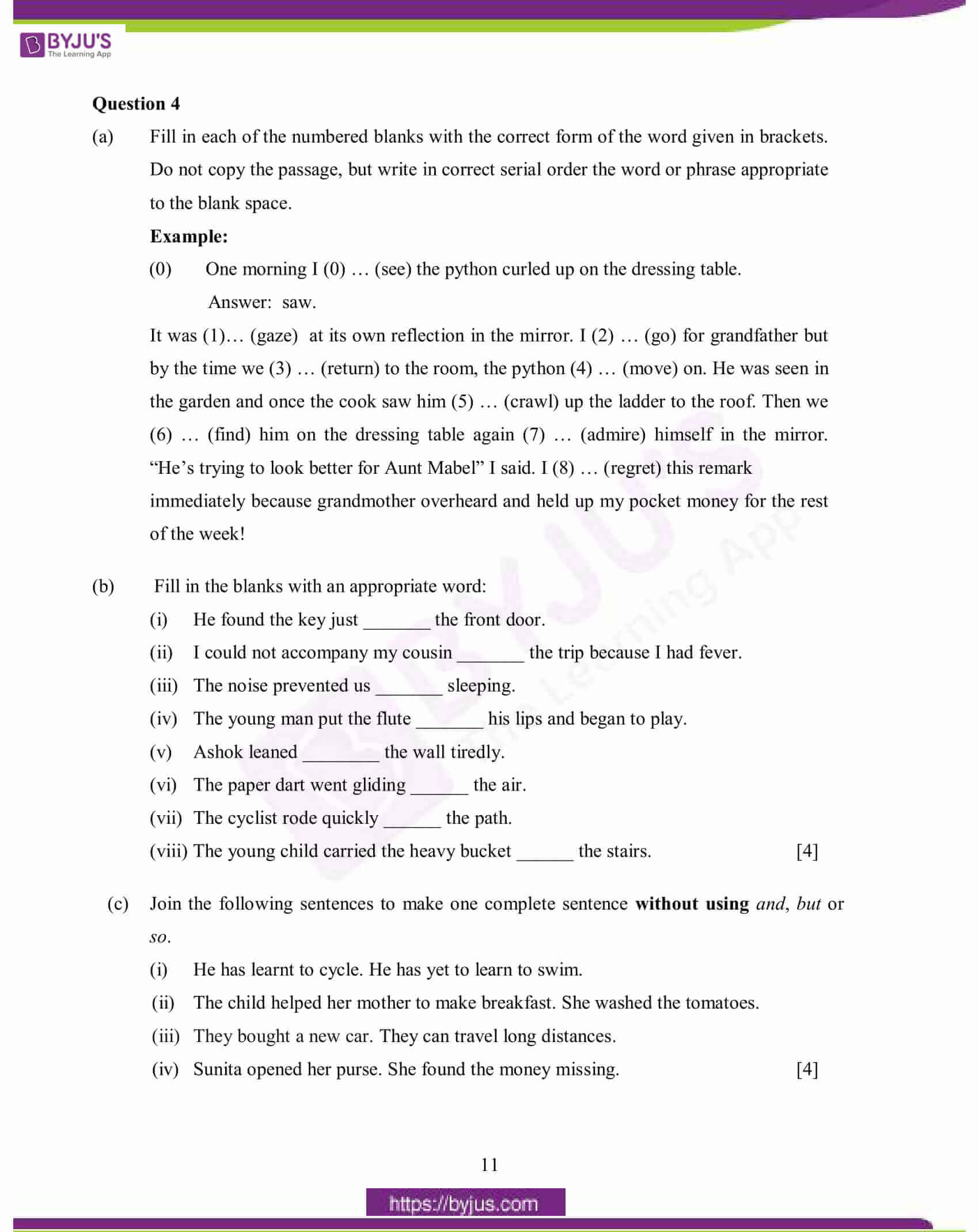
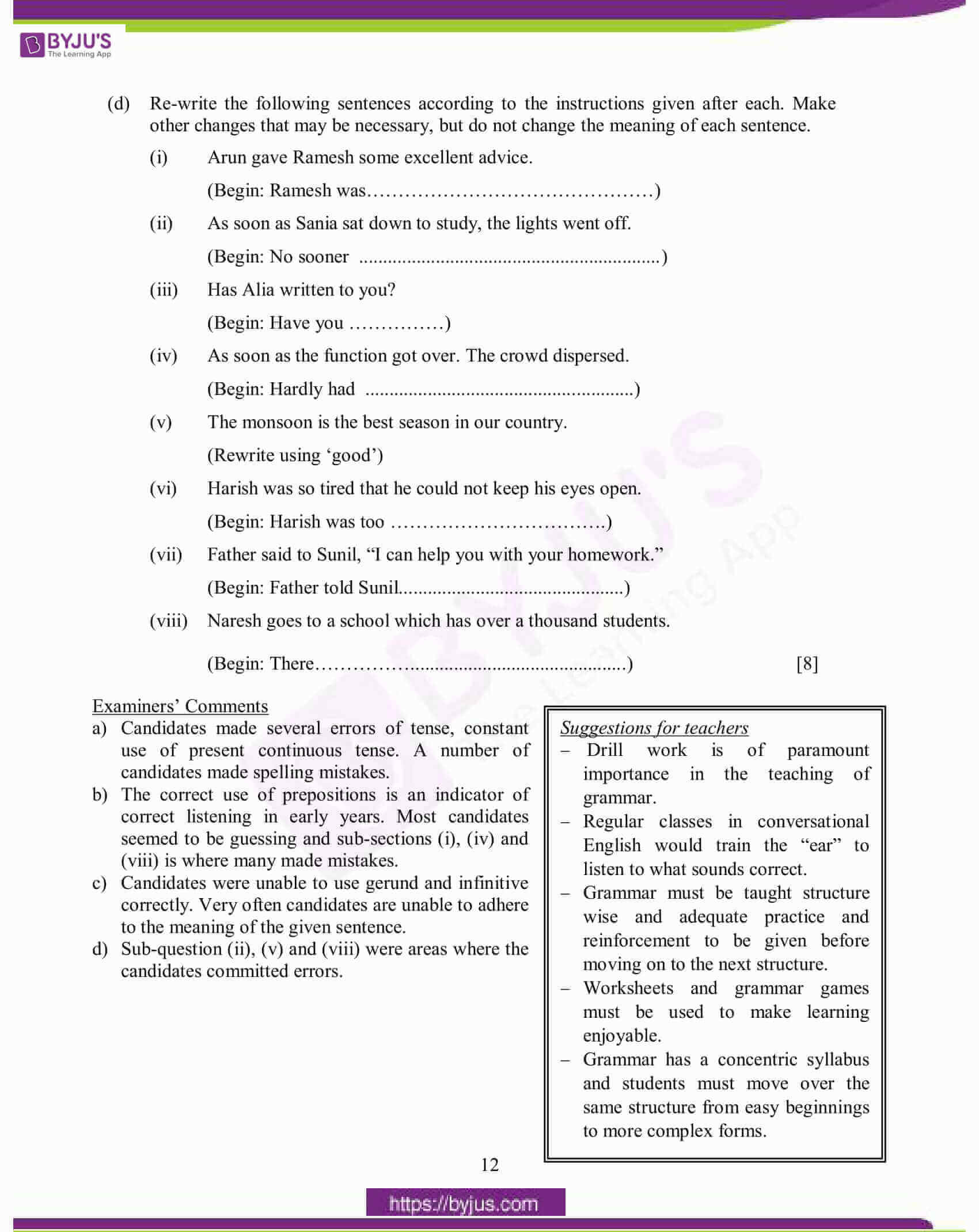
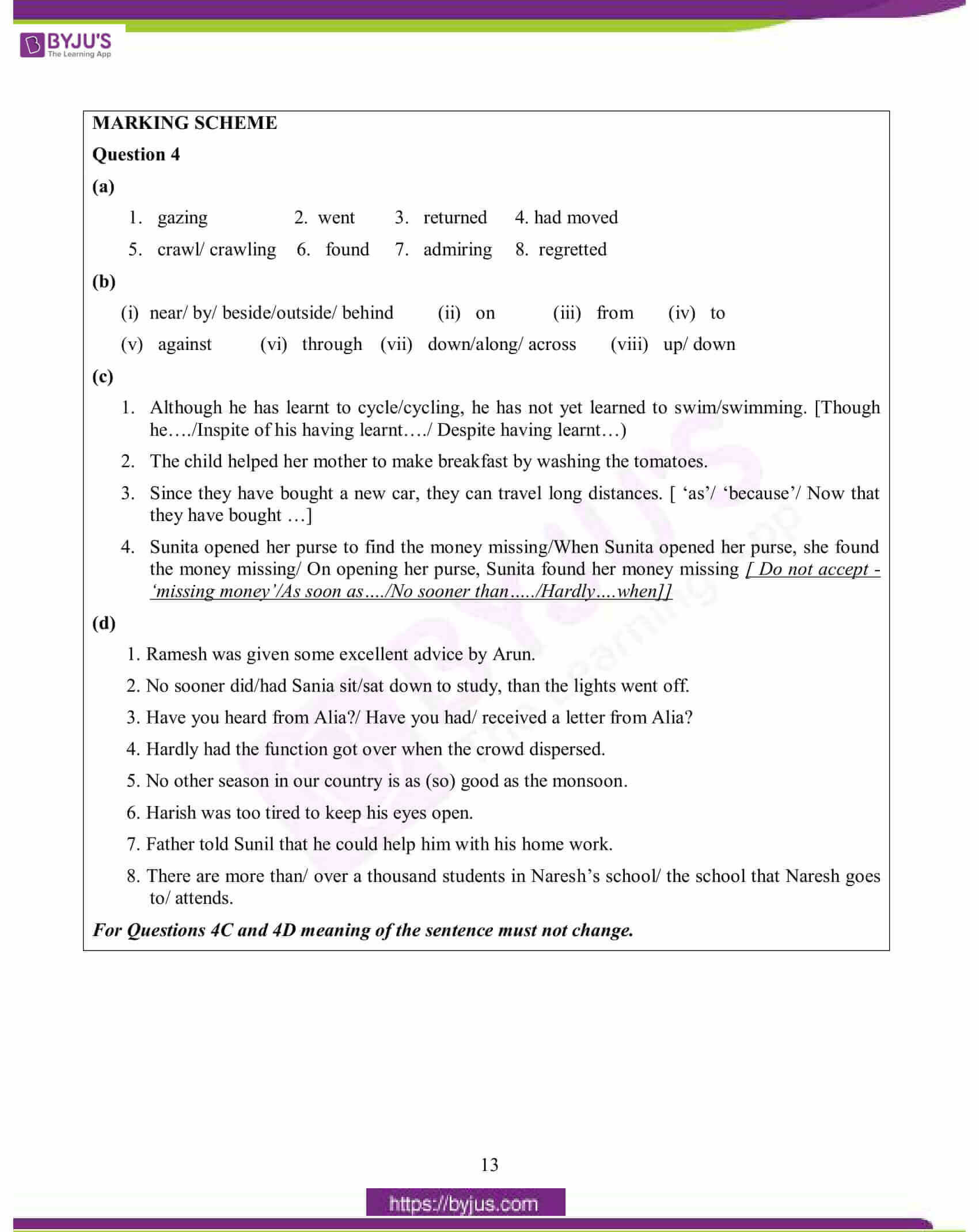
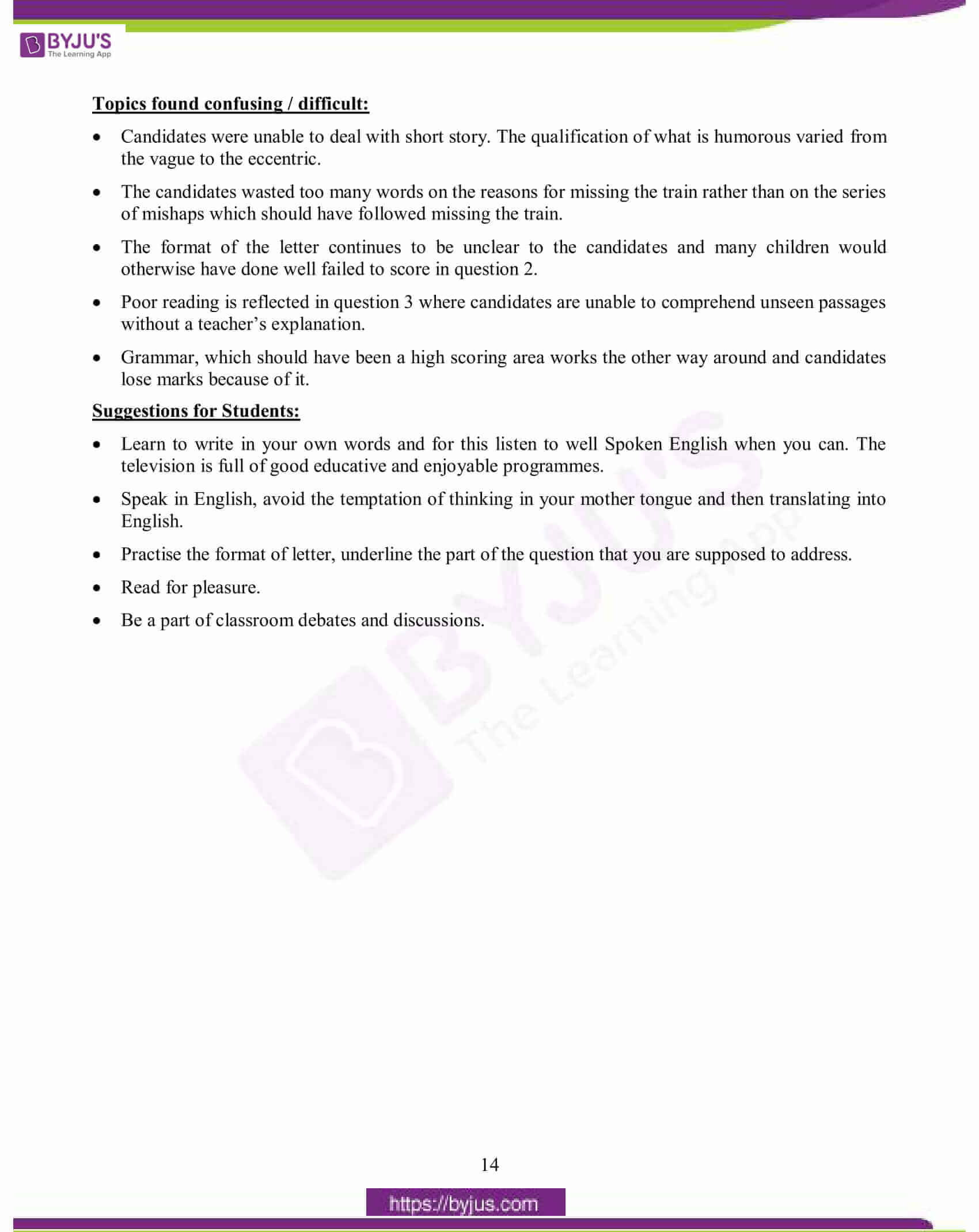
Comments